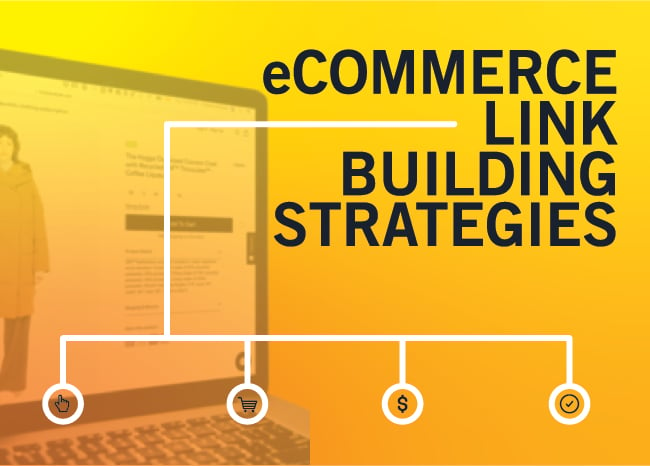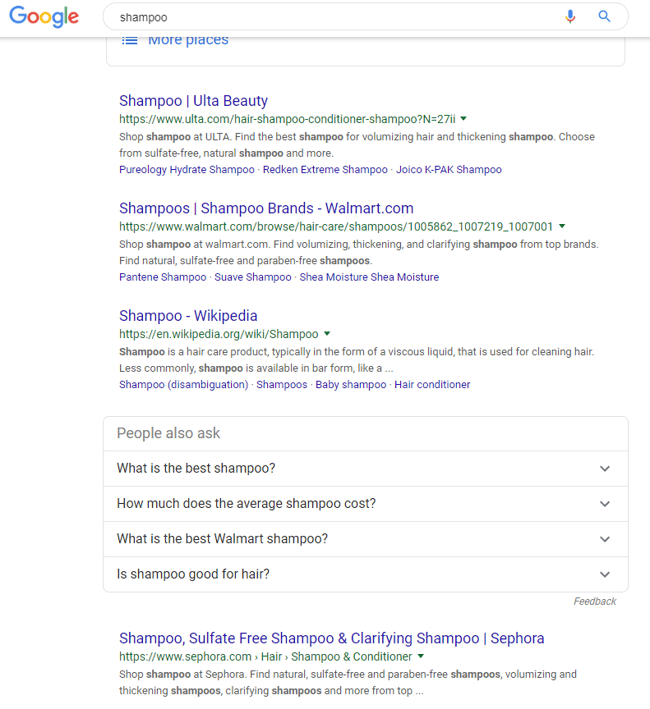It’s no secret that link building for ecommerce sites is hard. Whether you’re an SEO building links for a client or a website owner working to improve the visibility of your site, there are some unique challenges you face when building links for an ecommerce site.
Issues such as:
- Hyper-competitive niches.
- Increased impact from technical errors.
- Distrust and skepticism due to commercial focus.
- A lack of informational content and link-worthy pages.
All these factors contribute to the difficulty of building links for these types of sites. Even with all these issues, ecommerce link building is far from impossible and to be successful you need the right expectations and goals.

If your goal is to build links to your product pages and rank them for head key terms, you're going to have a bad time (unless you're an established, major brand).
For example, here are the organic results for [shampoo]:

Competing with Ulta Beauty, Walmart and Sephora is going to be difficult for a small-to-medium-sized beauty ecommerce site. However, there are areas and SERPs where smaller ecommerce sites can compete, and link acquisition can help!
The business metrics most ecommerce sites should be trying to influence with link building are branding and awareness. While link acquisition has an indirect impact on revenue (more people on your site can translate to more conversions), ecommerce link building campaigns should not be measured by conversions.
Rather than focusing on converting product pages, link acquisition should be aimed at informational pages that can bring top-funnel visitors to your site and expose them to your brand. If you're investing in link building as a branding strategy to grow the reach of your website, you're going to be successful — especially with Page One Power as a partner.
Now that we're on the same page, let's talk strategy and tactics.
Before You Pursue Links
Before you start contacting other websites in your pursuit for valuable backlinks, there are a few prerequisites you must have in place to be successful. To earn links that will improve branding and move the needle for your website:
- Make sure technical and on-page elements are optimized for search.
- Analyze and develop a deep understanding of your online audience.
- Create useful, informational pages that are link-worthy.
With these pieces in place, you'll be able to take full advantage of each link you secure.
Optimize Technical and On-Page Elements
On-page and technical SEO has increased importance for ecommerce sites.

Organization and site structure are critical to optimizing an ecommerce site for search engines and visitors — it should be easy to navigate and find a specific product or page. To create a clear structure, build audience-focused categories and use descriptive title and header tags on individual pages. For best practices, check out these resources:
Other optimizations that will maximize the benefit of any links you build include:
- Speed improvements.
- Implementing a sitemap.
- Removing duplicate content.
- Creating a secure site (HTTPS).
- Building a mobile-friendly design.
- Fixing error codes (404s, 301/302s. etc.)
Nothing diminishes or hinders a link campaign like a dysfunctional website — make sure your website is sound technically before you start building links.
Research Your Audience
If it's not clear by now, ecommerce link building is hard! To increase your odds of success, you need to have a deep understanding of your audience.
The benefits of understanding your audience for ecommerce link building are two-fold: you will know which types of pages they are searching for and where they engage online.
In fact, the type of audience you have can impact link building opportunities. Enthusiastic cause-driven or hobby-focused audiences are much more likely to have sites dedicated to your products — and subsequently, link to them. Some niches have consumers and others have enthusiasts, it's important to know which exist in your space.

For example, people actually have websites dedicated to flying drones — people don't create blogs about staplers. If you have a passionate audience, there might be some opportunity to secure links to your product pages.
As mentioned before, competing for head terms with major corporations (*cough* Amazon *cough*) will be difficult. However, if you know what questions your audience is asking, you can create pages that are legitimately the best answer for those long-tail queries — these pages will have a much better chance to rank and bring organic traffic.
By identifying where your audience lives online, you can begin engaging regularly in these communities, laying the groundwork for future link requests.
Create Linkable Pages
We have extensive experience building links for ecommerce sites at Page One Power, and our #1 recommendation to the majority of new clients is always:
"You need to create informational content that other sites will be compelled to link to." - Our Project Managers...often
Obviously, ecommerce sites exist to sell products, but you still need informational, non-promotional pages to grow your website and brand.
The audience that would benefit from a link to your product page is very small (those ready to buy), and other site owners will be reticent to link to commercial pages — this is essentially free advertising.
Informational content will help you build trust and familiarity with your audience, which pays dividends when the time comes that they're ready to buy. Furthermore, through internal link building you can direct link equity to your product pages from your informational content.
Simply creating a page that groups similar products that would benefit a specific audience can improve linkability, as this page would have added value. The key to crafting link-worthy pages is to offer value beyond a product that can be purchased.
Ecommerce Link Building
Understanding these basic conceptual strategies will help get you started off on the right foot. These strategies will establish a strong foundation for the real action: the tips and techniques that you can utilize to improve the efficacy of your link building efforts.
Competitor Backlink Analysis
A good place to start is with a competitor backlink analysis. You can counter the difficulty inherent in ecommerce link building by locating the links that your competitors have already found. After all, if your competitor can obtain links there with a similar product, then there’s no reason you can’t do the same.

However, be mindful to only target quality links as we've seen many ecommerce sites with toxic links in their backlink profiles.
To conduct a competitor backlink analysis and find these link prospects you must compile backlink reports on your competitors.
There a number of different tools you can use to create these reports:
Competitor backlink analysis should be one of your first actions during an ecommerce link building campaign.
Contact Complementary Businesses and Suppliers
Another effective strategy for ecommerce link building is targeting businesses that offer a product that is complementary to the one you sell. A mutually beneficial relationship already exists with these sites and you can leverage that relationship to acquire links.
You can also target manufacturers or suppliers of your products. Ask that they include a link to you within the portion of their website that lists retailers or places to buy their products. For sites that claim they only link to brick and mortar companies, ask if they will create an “online” section and include your business there.
These types of sites offer great linking opportunities and your chances of earning a link are much higher because they present a win-win situation.
Convert Unlinked Mentions
Monitoring brand mentions is a good marketing practice and can be a useful strategy for ecommerce link building.
In fact, we've found unlinked mentions are typically the best opportunities for ecommerce clients.
Of course, it is worth noting that you will need to have a strong brand presence in place to employ this strategy, as you’ll need people discussing your product, website or brand in a positive manner for this strategy to work.
There are a few different tools available that can help you monitor and locate these mentions:
These tools give you the ability to set up alerts to notify you via email any time a specific term is mentioned on the web. By entering your brand name or product into one of these tools, you can stay informed on where they are being mentioned around the internet.
Another great option for finding unlinked mentions is Google search and Google News.
Locating these mentions will provide you with some quality link prospects. People that are already interested in your products and talking about them will be much more willing to link back to you.

Some examples of mention opportunities we've found are common within ecommerce include:
- New product launches.
- Partnerships and acquisitions.
- Location openings and closures.
- Charity events and sponsorships.
- Syndicated or promoted content.
- Interviews with prominent employees.
Again, the basis for mention link building is coverage of your brand. You can work to generate this coverage by consistently engaging your community and being involved offline. Platforms like Help A Reporter Out (HARO) also offer opportunities to support journalists and earn coverage.
The ability to convert unlinked mentions into backlinks is critical to a successful ecommerce link building campaign.
404 Link Reclamation
Another viable strategy for ecommerce link building is 404 link reclamations.
Since ecommerce sites typically sell a wide variety of products, they usually have many pages. Large sites with many pages often have 404 link reclamation opportunities because when you have so many pages, some are liable to move or break, resulting in broken external links.
Also, because product inventory is fluid and ever-changing, pages may come and go as products are out of stock and re-stocked.
You can reclaim lost equity from 404s in two ways — reach out to the linking sites with a new, functional URL and ask them to update the link or simply 301 the broken URL to a relevant, functioning page. Typically, the 301 option is easier and more successful, since you don't have to ask another person to make the fix.
Content Link Building
Finally, if you are struggling with ecommerce link building you should consider creating a linkable asset to aid your link building efforts.
Most site owners won't link to a product page, which can make for a very shallow pool of link prospects. To overcome this challenge, try creating a linkable asset.
This asset should be something useful and valuable, that a site owner would want to link to because it benefits their audience. Some examples of linkable assets include:
- Helpful tools or calculators.
- Interactive games or quizzes.
- Interviews with industry leaders.
- Informative PDFs or white-papers.
Typically, webmasters will be much more open to linking to things like this and it will provide you with more prospects for your ecommerce link building campaign.
Another useful asset you can leverage is a blog. Site owners that are unwilling to link to your product pages or home page are usually more open to linking to a blog that contains useful information. To earn links, your blog needs to be consumer-focused, rather than focused on discussing your company and products.
Effective content link acquisition is predicated on having quality blog resources to link back to, and with internal linking these blogs can pass on authority to your product pages.
Key Takeaways
Before you start link acquisition:
- Optimize technical and on-page SEO elements.
- Conduct extensive audience research.
- Build best-in-class informational pages.
Ecommerce link building tactics:
- Find competitor links through competitive analysis.
- Reach out to complementary business for link opportunities.
- Find unlinked mentions and convert them into backlinks.
- Create high-quality linkable assets and engaging blog content to expand link building opportunities.
Link building, in general, is hard work — but ecommerce link building can be especially difficult. Ecommerce sites face numerous challenges and obstacles in regards to link acquisition, but implementing the strategies listed here can help you be more successful.

